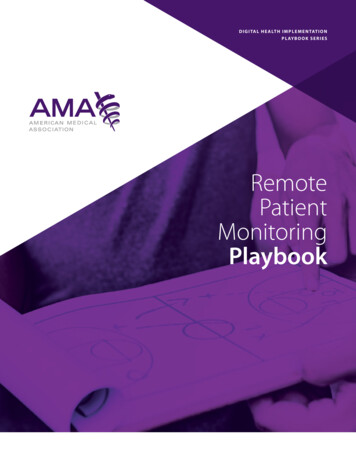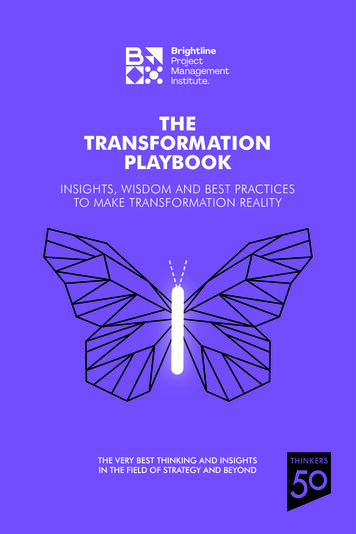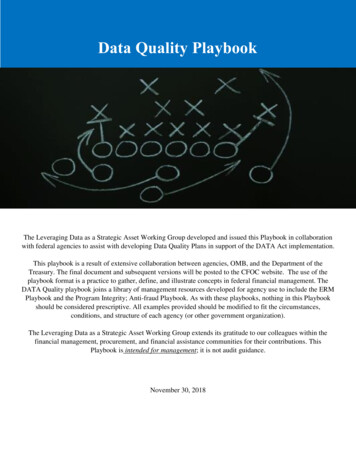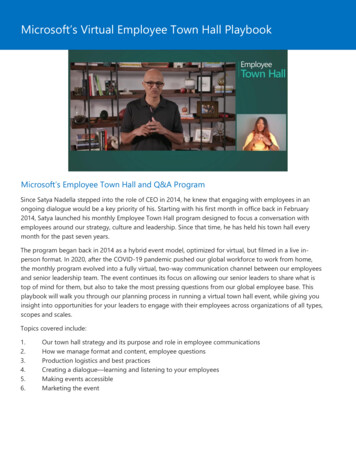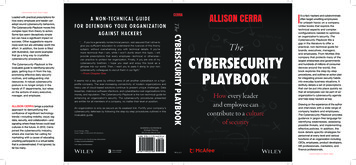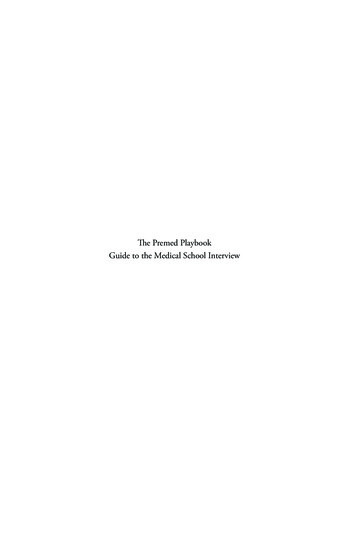
Transcription
The Premed PlaybookGuide to the Medical School Interview
Endorsements“Dr. Gray has compiled a very detailed, comprehensive, andpractical book on the medical school interview. What makes this bookso unique is his emphasis on the introspective process. Instead of simplyproviding a checklist of do’s and don’ts, he challenges the reader toexamine their strengths and weaknesses and gives them a blueprint onhow to put their best foot forward. His advice is real-world and compiledby many interviewers, including myself, who have years of experienceinterviewing medical school applicants. I highly recommend this book asa fundamental preparation tool for the application process.”Gregory M. Polites, MDAssociate Professor of Emergency MedicineChairman of the Central Subcommittee on AdmissionsWashington University School of Medicine“The Premed Playbook is a must-have for every future doctor’scollection. Great advice, comprehensive, and to the point. Dr. Graybreaks it down, play by play.Sujay Kansagra, MDAuthor of The Medical School Manual,Everything I Learned in Medical School,and Why Medicine”“Dr. Gray offers a simple and concise guide to having a successfulmedical school interview. Having been through the medical schoolprocess three times while applying and then serving on the admissionscommittee during my last year of medical school, I know what it takesto have a successful interview. I highly recommend this book for everystudent to read and have available for reference during the medical schoolinterview season.”Antonio J. Webb, MDAuthor of Overcoming the Odds
THEPREMEDPLAYBOOKGuide to the Medical School InterviewBe Prepared, Perform Well, Get AcceptedRyan Gray, MDNEW YORKNASHVILLE MELBOURNE VANCOUVER
The Premed Playbook Guide to theMedical School InterviewBe Prepared, Perform Well, Get Accepted 2017 Ryan Gray, MDAll rights reserved. No portion of this book may be reproduced, stored in a retrievalsystem, or transmitted in any form or by any means—electronic, mechanical,photocopy, recording, scanning, or other‚—except for brief quotations in criticalreviews or articles, without the prior written permission of the publisher.Published in New York, New York, by Morgan James Publishing. Morgan James is atrademark of Morgan James, LLC. www.MorganJamesPublishing.comThe Morgan James Speakers Group can bring authors to your live event. For moreinformation or to book an event visit The Morgan James Speakers Group atwww.TheMorganJamesSpeakersGroup.com.ISBN 9781683502159 paperbackISBN 9781683502166 eBookISBN 9781683502173 hardcoverLibrary of Congress Control Number: 2016914310Cover Design by:Rachel Lopezwww.r2cdesign.comInterior Design by:Chris Treccaniwww.3dogdesign.netIn an effort to support local communities, raise awareness and funds, Morgan JamesPublishing donates a percentage of all book sales for the life of each book toHabitat for Humanity Peninsula and Greater Williamsburg.Get involved today! Visitwww.MorganJamesBuilds.comTo my amazing wife, Allison,for supporting me on this journey.
DOWNLOAD 3 FULL MOCKINTERVIEWS FOR FREEDisclosureSome links in this book are affiliate links. If you end up using theproduct I recommend (I only recommend products I trust), I getsome beer money.READ THIS FIRSTJust to say thanks for purchasing my book, I wouldlike to give you 3 full mock interview recordings,100% FREE!CLICK HERE TO DOWNLOAD(or go to: )
Table of ContentsIntroductionxiiiSection IChapter 1Chapter 2Chapter 3Chapter 4Chapter 5Chapter 6Chapter 7Chapter 8Chapter 9Chapter 10Chapter 11The KnowledgeThe Process Leading up to the InterviewWhy It’s ImportantWhy You Didn’t Get an InterviewDifferent is Better Than BetterCore Competencies and Holistic ReviewTypes of InterviewsBefore the InterviewAfter the InterviewCommon MistakesHow to SucceedMock Interview PrepSection IIChapter 12The QuestionsOpening Questionsxvii15711152127353947495355xi
xii Guide to the Medical School InterviewChapter 13Chapter 14Chapter 15Chapter 16Chapter 17Chapter 18Chapter 19Chapter 20Chapter 21Chapter 22Chapter 23Chapter 24Grades and MCAT Score QuestionsExtracurricular Activities Questions“Why Medicine?” QuestionsEthical and Moral QuestionsPolitics, Policy and Healthcare Questions‘Your Future’ QuestionsPersonal QuestionsSchool Related QuestionsMiscellaneous QuestionsMultiple Mini Interview ScenariosQuestions to Ask the InterviewerQuestions to Ask the Medical StudentsSection IIIChapter 25Chapter 26Chapter 27Chapter 28Chapter 29Chapter 30Chapter 31Chapter 32Chapter 33Chapter 34The Examples105Tell Me About Yourself107Any Red Flags?127Why Medicine?135Why Not Nurse or PA?147Why DO?151What is Your Biggest Weakness?157What is the Biggest Challenge Facing Healthcare?163What do you Think About the ACA?167Talk About Your Poor Grades173What are your Thoughts on Abortion? (And Other Ethicaland Moral Questions)177Why Should We Pick You?185Chapter 35ClosingAbout the 199203205209IntroductionLittle did I know, when I was interviewing for medical school many years ago,that I would now be teaching other students how to successfully prepare fortheir own medical school interviews.Like some of you, I went to a large state school—the University of Florida.Even though the majority of premed advisors are working hard to give you thebest guidance available, I was just another number on my advisor’s roster. Thisled to her not knowing me very well, if at all. I was told by my advisor not toapply to medical school. Her advice was not based on my GPA (I finished with a3.73 science GPA), and it was not based on my Medical College Admissions Test(MCAT) (I hadn’t taken it yet). I was told not to apply to medical school becauseI was a white male. She said that there were too many of ‘us’ applying.Hopefully, your school (assuming you are in school) has a great premedadvising office. While my experience was definitely rough, these advisors areworking hard to make sure that they are making you as successful as possible.Please use them as your first stop in gathering information. They know you, yourschool, and are there to give you feedback specific to you.xiii
xiv The PreMed PlaybookNeedless to say, I didn’t seek out much more advice from her and was leftto navigate the last two years of my undergraduate studies on my own. Luckily,I was surrounded by a group of amazing friends and classmates who were alsopremed, and we collectively sought out as much information as we could findthat could help us prepare for medical school.The first time I applied to medical school, it was the first year the AmericanMedical College Application Service (AMCAS) process was online. All thestudents applying that year were unluckily blessed with using software thatprobably wasn’t ready for release. It took multiple attempts to enter in information,only to be left with a blank screen and nothing saved at the end. Finally, after thegrueling process, I submitted my application, only to learn that the computersystem transmitting the application to the schools had its own glitches.The Association of American Medical Colleges (AAMC) had to print out allof the applications and mail them to each of the schools that had been appliedto. Unfortunately, this was during the anthrax scare in 2001, which shut downthe mail service in D.C.—where the AAMC is located. Even after all of that, Iwas still a strong enough applicant to have received two interviews, one at theUniversity of Florida where I was an undergrad, and the other at the Universityof Colorado.I remember how nervous I was on each of the interview days. I remembergoing in thinking that I didn’t belong there, that there must have been a mistake;the staff was going to find out when I checked in that I really didn’t have aninterview. It wasn’t a mistake. I had my interviews, and the days went as smoothlyas I could have hoped for. I remember walking around the campus during thetour in awe of my surroundings, giddy that one day I was going to be a studenthere, just like all of the medical students I saw roaming the halls. I thought theinterviews went well, but I guess they weren’t good enough. I wasn’t accepted ateither school. I didn’t even make a waitlist. I was crushed and didn’t think I wasgoing to be able to become a physician.After doing some research, I found out that, to be a more competitiveapplicant, there were some items lacking in my application. For starters, I neededformal shadowing experience, which I hadn’t had before. I mostly had donetraditional volunteer work at the hospital—working at the information deskIntroduction xvshowing people where the elevators were, and transporting patients to and fromdifferent tests and procedures.Shadowing, as I know now, is a valuable tool to help you gain insight intowhat life is like as a physician. It’s not clinical or hands-on experience, but itallows you to get close to the action, and see what your life may look like inthe future. Admissions committees want to make sure you know what you aregetting yourself into (and aren’t basing the next 7 years of your life on scenesfrom Grey’s Anatomy).Two years later, after moving to Colorado and finding an orthopedic surgeonto shadow (ok, my mom found him), I reapplied to medical school. This timethe computer systems were working well, but I only received one interviewinvite. It was from New York Medical College (NYMC). The interview day wentwell. I had a higher sense of appreciation this time around, because of the pastrejections. It meant a lot more to me this time. I wanted it more. I needed itmore. And this time, they wanted me too.At the time of my acceptance, I was working as a Fitness Program Managerfor a gym in Boston. That job gave me amazing experience managing otherpeople and running a business—two skills I thought would be valuable one dayas a physician. I contacted NYMC and asked that I be allowed to defer one yearand enter with the class of 2009 instead of 2008. They agreed. That decision hada significant impact on my life because it was during orientation week in 2005that I met Allison, who is now my wife. I went on to complete my four years atNYMC on an Air Force scholarship, I did a one-year transitional internship inthe Boston area, and completed five years of active duty military service with theUnited States Air Force.In 2012, knowing that there was a severe lack of good information aboutthe premed process online, I started the Medical School Headquarters to helppremed students, like you, navigate the path to medical school. I want you tohave the expert advice that I didn’t have. I want to provide you with advice that Ihave gathered from the experts, from those who are actually making admissionsdecisions, and not just other premeds. The Premed Years podcast has given methe opportunity to interview former and current deans of medical schools and
xvi Guide to the Medical School Interviewother Admissions Committee members. I want you to see that getting intomedical school is possible, even if you’ve made mistakes along the way.This book focuses on the medical school interview process: I’m going to helpyou understand the importance of the interview, teach you strategies to preparefor it, make sure you make the most of the day, and teach you the differentcategories of questions, as well as some frameworks on how to answer eachcategory. I do want you to understand one thing though—it doesn’t matter howmany books you read about the medical school interview, if you don’t put inthe effort to practice, then you’re setting yourself up for disaster. Don’t worrythough—we’ll cover ways for you to get the practice you need. If you read thisbook and dedicate the time to practice, then an acceptance to medical schoolis closer than you can imagine. I can’t guarantee that you will be accepted intomedical school just from reading this book, but I can guarantee that you will bebetter prepared for interview day.SEC TION IThe Knowledge
C HA PTER 1THE PROCESS LEADING UP TO THEINTERVIEWI’m not going to cover the entire premed process in this book, but I do wantto provide you with some basic insight so you know what to expect with theapplication process leading up to your interview. Texas has their own medicalschool application service, the Texas Medical & Dental School ApplicationService (TMDSAS), and their timeline is slightly different but close enough thatI won’t address it separately. The other two application services, the AmericanMedical College Application (AMCAS), and the American Association ofColleges of Osteopathic Medicine Application Service (AACOMAS) are theapplication services for MD schools and DO schools, respectively.The application process opens up in May the year before you plan on startingmedical school. You are given approximately a month to fill in the informationneeded to apply, which includes grades, extracurricular activities, demographics,your personal statement and other miscellaneous information. At the beginning1
2 Guide to the Medical School Interviewof June, you can submit your primary applications for verification. Yourtranscripts, which you need to have submitted to each of the application services,are compared to the grades that you manually entered. After your application isverified and the application service has done their part, they will submit yourapplication to each of the schools you selected. This process typically takes placestarting the last week of June, assuming you submitted your application early—which you should plan on.After you submit your primary applications, most of the medical schoolsyou apply to will send you a secondary application to fill out. Depending on theschool’s policies, some will do this even without looking at your initial application.Secondary applications usually consist of more essays. Some examples of theseinclude describing any gaps in your education, describing your desire to attendthat medical school, your understanding and experience with diversity anddescribing a challenging situation that you’ve had to overcome. You’ll want toturn these essays in as soon as possible. Secondary applications are expensive; youcan expect to pay about 100 for each secondary application.After your secondary applications have been submitted, your work is done—assuming your MCAT scores have been released. If you are still waiting on anMCAT test date or a score to be released, some schools will wait for your scorebefore they review your application. Once your application is complete, theschool will review it and will decide whether or not you will be invited for aninterview. These invitations will be sent via email, so make sure you are using avalid email address when you submit your application.Most medical schools use what is known as a rolling admissions process,which I like to compare to a big game of musical chairs. Due to the fact that eachschool offers a limited number of interviews, the longer you wait to submit yourapplication, and the later your MCAT scores are released, the less likely you areto obtain an invitation for an interview. If they are reviewing your applicationlater in the cycle, they have already invited many students and are getting closeto filling all of their interview slots.The day you receive your first interview invite is a great day. It’s a day you’veworked so hard to get to. You’ve sacrificed a lot to get the interview, but the workThe Process Leading up to the Interview 3isn’t over yet. Let’s talk about why the medical school interview is so importantand how to best prepare for it.
C HA PTER 2WHY IT’S IMPORTANTThe medical school interview gives the Admissions Committee an opportunityto learn more about you as a person, and not just what is in your application. Itgives them the ability to judge how well you may fit into the rest of the enteringclass. It allows them to listen to you, observe you, and communicate with you.With thousands of applications coming into each medical school every year,there has to be a way for the school to figure out who they are going to accept andwho they are going to reject. Much of this initial process is done automaticallybased on filters that schools can set with the application software. Some schoolsclaim that they review every application, but what they don’t tell you is that theyare likely sorting the applications based on GPA and MCAT, and if your scoresare below average, there’s a good chance that the Admissions Committee willnever review your application. But, if you do get that golden ticket, and receivean interview invite, the school has determined that you are a candidate worthyof further consideration.5
6 Guide to the Medical School InterviewReviewing information available on a few medical school websites, thepercentage of applicants at each school who are invited for an interview islow, only about 15-20%. For example, according to Albert Einstein Collegeof Medicine’s 2015-2016 Applicant Guide1, they interviewed about 16% oftheir applicants (1,324 students out of 8,138 applications). If you received aninterview invite, then you are way ahead of the game.Here’s why the interview is so important. You have to assume the mindsetthat the acceptance is yours to lose when you receive an interview invite. Whilethat may be stretching the truth a little, the fact is that the school thinks yourgrades are good enough. Your extracurricular activities are good enough. Yourletters of recommendation are good enough. What else is there? All that is leftis you! Can you still get in if you bomb your interview, even with an amazingapplication? Probably not. If you don’t shine, but don’t fail the interview, willyou still have a chance if the rest of your application is great? There’s a goodchance. Medical schools understand the amount of stress you are under. Theyunderstand that the interview process can be subjective. They try their best toremove those variables, but people are still people, and the person interviewingyou has his or her own biases. Most interviews consist of you meeting withmultiple interviewers, so if you don’t do well with one, you will need to mentallyreset and go into the next interview fresh and confident. The best golfers in theworld are the ones who can make a bad shot and forget about it as soon they areready for the next shot. You need to have this mindset too.At the end of the day, you need to go in prepared to be yourself and beconfident. Make the committee members have no choice but to believe in you.Leave them no choice but to believe in you.C HA PTER 3WHY YOU DIDN’T GET ANINTERVIEWIf you didn’t get an interview from a school that you assumed you would, thenyou made a very common mistake. There is no such thing as a safety schoolor fallback school. Here are some things to keep in mind. Medical schools arealways looking for students who they believe will be academically successful.If your grades or MCAT scores don’t show them that you can be successful asa student, you won’t get an interview. If you are applying to a large number ofpublic schools as an out-of-state applicant, you are fighting an uphill battle. Stateschools almost always look to admit state residents. Some schools are lookingfor students interested in primary care. Some are seeking students who want topractice in rural areas. What exactly they are looking for, nobody knows exceptfor them.In addition to the unknown factors that each school is looking for, you’re alsodealing with individual biases from each member of the Admissions Committee.7
8 Guide to the Medical School InterviewEach person has their own experiences and set of lenses that they are lookingthrough as they review your application. It could be the B- you got in organicchemistry, or that substandard MCAT score, or perhaps you are missing that onetruly outstanding extracurricular activity that they were looking for. This is whyit’s so important to apply broadly to many different schools and not just the onesthat you think you have a shot at. I’ve seen great applications from students whoshould have received an acceptance, but who only applied to one school, therebyseverely limiting their chances of being accepted.The most common reason for not getting accepted to medical school,according to some Admissions Committee members, is a lack of enough clinicalexposure. Remember, schools need to make sure you understand what you aregetting yourself into. Medical school and being a physician isn’t what it seems tobe from watching an episode of Grey’s Anatomy or Scrubs. Unlike shadowing,which is what I was missing in my application, clinical experience puts you upfront and center with the patient. Just because you like science and want tohelp people doesn’t mean you will actually like helping sick people. Clinicalexperience will help you figure that out and give confidence to the AdmissionsCommittee that you are in fact ready for this career.Of course, there are some major red flags that, if present in your application,might cause a school to not invite you for an interview. These red flags caninclude: criminal records including DUI or other arrests, or disciplinary actionsfrom your university due to plagiarism or other infractions. These are questionson the application that you have to answer, so it’s very easy for the school toput your application into the “Do Not Interview” pile, just for marking ‘Yes’in one of those boxes. Of course, I’ve also seen students with red flags in theirapplication receive an interview invitation and gain their acceptance. Kain wasone student I interviewed on The Premed Years podcast. He was academicallydismissed from his undergrad program his first time through. Many years later,he wanted to go back and give medical school another shot. He had to workhard and jump through some hoops, but after all of that hard work, he earnedan acceptance to the University of Central Florida College of Medicine. You canhear his story at http://medicalschoolhq.net/174.Why You Didn’t Get an Interview 9If your GPA and MCAT scores are drastically below the school’s average,it is unlikely that you will get an interview. Use the Medical School AdmissionRequirements2 (MSAR) service from the AAMC and the College InformationBook3 (CIB) from the AACOM to see what the averages are for the schools youare interested in applying to.There is a general rule of thumb that circulates online which compares yourMCAT and GPA scores to a specific school, determining whether or not youshould apply. I, however, don’t believe in this rule of thumb. You have a 0%chance of getting into a school that you don’t apply to, and a higher chance ofgetting in if you do apply. There may be something in your application whichwill entice an admissions committee member to overlook a poor MCAT scoreor a low GPA. The average number of schools that students apply to accordingto both the AAMC and AACOM is about 154 and 95, respectively. This meansthat students who are applying to both MD and DO schools are applying to anaverage of 24 schools. The total number of schools that you apply to should bedetermined by where you are interested in going, your strength as an applicant,and your budget. The cost of applying to medical school adds up very quickly.Don’t be surprised if it ends up costing you several thousand dollars to apply andtravel for your interviews. This is another good reason why you need to prepareyourself in the best way possible.If you don’t get an interview, you can always try to advocate for yourselfby reaching out to the school and requesting them to reconsider their initialdecision. You will need to effectively convince the school that you are a worthycandidate, and why they should look past any sort of red flags that may beputting your application in the wrong pile.I coached one student to help him prepare for an interview at Wake Forest.He didn’t get an interview initially because he was rejected before that stage. Butwhen his fiancée was accepted, he immediately wrote a letter and overnighted itto the dean of admissions. He had an interview invite that same week, and anacceptance letter soon after his interview. The school didn’t accept him becauseof his fiancée, but they did give his application a second chance because of it.Some schools will offer an application review in which they will talk to youand let you know why you didn’t get an interview. Not every school offers this,
10 Guide to the Medical School Interviewand sometimes the review will have to be delayed due to the application cycleand volume of applicants, but you can request it.When you don’t receive an invitation for an interview, there is most likelysomething in your application that medical schools don’t like. You need to figureout what it is, fix it, and reapply. Being a reapplicant is not a bad thing; it won’thurt your chances of getting into medical school—with one caveat: There aresome medical schools that will restrict you from applying more than two orthree times. You really need to do your research into each school to know each oftheir requirements and restrictions. The best place to do this is on each school’swebsite.I did a great interview with a former dean of admissions about being areapplicant. You can find that interview at http://medicalschoolhq.net/171.C HA PTER 4DIFFERENT IS BETTER THAN BETTERWhat truly separates each applicant? What separates those who get intomedical school from those who are left holding rejection letters? I wish itwere as simple as giving you a checklist and telling you that if you checkevery box, you will have an acceptance to medical school. Unfortunately, it’s notthat easy. As discussed in the previous chapter, every school is looking for specificattributes in the students who will make up their next class. If you don’t possessthose attributes, then you might not be accepted, regardless of your MCAT andGPA scores. It’s often said that you need to stand out in your application to getin. But what does that really mean? Does it mean you need a 4.0 GPA, a 528on the MCAT, and thousands of hours of shadowing and volunteer experience?Schools are not looking for the perfect applicant. They are looking for astudent who has demonstrated that he or she is able to handle the medical schoolcurriculum, do well in residency, and more importantly, be a good human beingwho is willing to put others before him or herself. These are the attributes thatmake up a great applicant to medical school, and ultimately a great physician.11
12 Guide to the Medical School InterviewNontraditional students have an advantage when it comes to demonstratingmany of the traits that medical schools are looking for. Traditional students havebeen locked up in school for all of their lives without gaining much real-worldexperience. Nontraditional students, on the other hand, have been out in theworkforce, may have traveled the world, and have first-hand knowledge of whatit’s like to not be a student. This allows the nontraditional students to more easilybuild rapport with patients.What can separate you, regardless of whether you’re a traditional ornontraditional student, is YOU. If every applicant to medical school has a 3.5GPA and 520 on the MCAT, how will the schools choose who gets in and whodoes not? Each person, the person behind the numbers, is what separates everyapplication—your experiences, childhood, good times, bad times, personality,and communication skills. Each of your individual traits is what separates youfrom your fellow classmates. Don’t make excuses that you lead a boring life. It’syour life; it is what makes you different. Yes, if you don’t put in any effort andyou go to class and go home, you’re not going to set yourself apart. You need toexplore the world with your own eyes, not go through life checking off boxesassuming that doing just that will get you into medical school. You need to createopportunities that will allow you to expand your horizons and increase your lifeexperiences, all while trying to juggle school, friendships, family and more.How can you start to do that? Well, if you’re a nontraditional student, you’vealready done that. The mere fact that you’re a nontraditional student has madeyou different. Jessica, for example, was a nontraditional premed student. Havingalready gone to college to pursue acting, she was living in Los Angeles, workingas an actress when health problems struck her dad. Through her interactionswith his physicians, her desires changed. She went back to college and completedher medical school prerequisites through a post-baccalaureate program. Sheapplied broadly to medical schools and went on 11 interviews. She received tenacceptances and was waitlisted at the 11th (I wonder what that 11th schoolwas thinking!). You can hear more about her story at http://medicalschoolhq.net/168. Yes, her grades and her MCAT score were good. But good grades and agood MCAT score don’t earn you ten acceptances. Her story and her experiencesearned her that. She earned ten acceptances by knowing what made her differentDifferent is Better Than Better 13and by highlighting that on her application and during her interviews. Together,we worked hard crafting her personal statement and honing her interviewresponses during her mock interview prep. When I followed up with her, shetalked about her interviews and how the interviewers wanted to talk about heracting career and not her academics. Acting was something different, and that’swhat they were drawn to.If you’re a traditional student, look at what Alex did at the University ofFlorida with his Dream Team project (http://medicalschoolhq.net/83). Alex, anundergraduate student, co-founded the Dream Team after seeing a need at alocal hospital. He did the work, and now several years later his creation hascontributed over 5,000 hours of direct volunteering time to help support thekids in the hospital. Alex is different.
practical book on the medical school interview. What makes this book so unique is his emphasis on the introspective process. Instead of simply providing a checklist of do's and don'ts, he challenges the reader to examine their strengths and weaknesses and gives them a blueprint on how to put their best foot forward.





